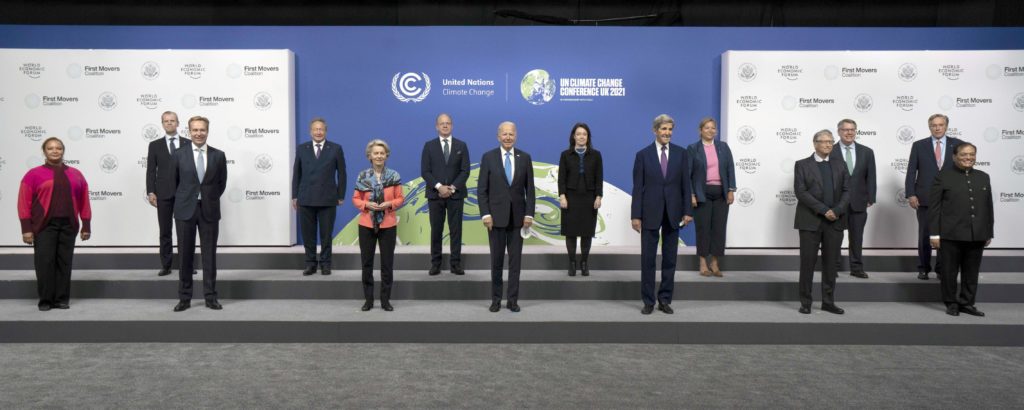First Movers Coalition launches at COP26
By Julian Atchison on November 04, 2021

Thirty-four leading global organisations, the World Economic Forum and the US Special Presidential Envoy for Climate John Kerry have founded a new group: the First Movers Coalition. The group’s purpose is to invest in green technologies so they are available for massive scale-up by 2030, allowing for rapid decarbonisation of the hardest-to-abate industries. Eight sectors are the focus – steel, trucking, shipping, aviation, cement, aluminum, chemicals, and direct air capture – with the first four of those to be the group’s initial focus from next year. The implications for ammonia energy are huge, as many of the group’s founding members are already deeply involved in the space.
Trafigura
Commodity trader Trafigura has already forged a number of partnerships in the maritime ammonia space in 2021. As part of joining First Movers, they also announced that 18% of their fleet (six ammonia carriers) will have their existing MAN ES engines converted to run on ammonia fuel by 2030.
Yara
At the launch in Glasgow, Yara CEO Svein Tore Holsether indicated his organisation’s contribution would be to decarbonise agriculture and long-distance maritime transportation at sea through the development of green ammonia.
Fortescue
Both Fortescue Metals Group and Fortescue Future Industries are part of the new group. At Glasgow, FFI CEO Julie Shuttleworth AM affirmed her organisation’s intention to decarbonise its operations by 2030 using renewable electricity, green hydrogen and green ammonia.
Maersk
Maersk is signing up to a target that at least 5% of its deep-sea shipping operations will be powered by zero-emission fuels by 2030. The commitments aim to be collectively significant enough to commercialize decarbonization technologies. They follow similar ambitions from leading global retailers last month, where brands including Unilever, Ikea and Inditex announced a target to progressively switch all of their ocean freight to vessels powered by zero-carbon fuels by 2040.
Official Maersk press release, 4 Nov 2021
Purchasing commitments
As indicated in Maersk’s press release, membership of the First Movers Coalition comes with a set of purchasing commitments in at least one of the abatement sectors. A 5% utilisation benchmark for zero-emissions fuels by 2030 in the shipping sector is roughly in line with maritime fuel forecasts reported at Ammonia Energy. The commitment from cargo owners to ensure their goods are shipped on only zero-emissions vessels by 2040 is in line with the ambitions of Cargo Owners for Zero Emission Vessels (coZEV), another group launched earlier this month.
Shipping: Members commit to use zero-emission fuels in new and in retrofitted zero-emission vessels by 2030. Carriers set a target that at least 5% of their deep-sea shipping will be powered by zero-emission fuels by 2030, enabled by ships capable of using zero-emission fuels. Cargo owners set a target that at least 10% of the volume of their goods shipped internationally will be on ships using zero-emission fuels by 2030, on the way to 100% by 2040.
Aviation: Members commit to use emerging technologies including sustainable aviation fuels (SAF) with significant emissions reductions, electric, and hydrogen propulsion for air travel by 2030.
Airlines and air transport companies set a target of replacing at least 5% of conventional jet fuel demand with SAF that reduces life-cycle GHG emissions by 85% or more when compared with conventional jet fuel, and/or using zero-carbon emitting propulsion technologies by 2030.
Airfare and air freight purchasers set a target of replacing at least 5% of conventional jet fuel demand for air transport with SAF that reduce life-cycle GHG emissions by 85% or more when compared with conventional jet fuel, and/or zero-carbon emitting propulsion technologies by 2030 – in partnership with air transport operators.
Trucking: Members commit to purchase or contract zero-emission medium and heavy-duty vehicles by 2030. These can include battery or fuel-cell electric vehicles and also incorporate renewable sources of electricity and hydrogen for charging. Trucking owners and operators also set a target that at least 30% of their heavy-duty and 100% of their medium-duty truck purchases will be zero-emission trucks by 2030. Retailers & manufacturers set a target that they will require all of their trucking service providers to meet the trucking owners and operators’ commitment by 2030.
Steel: Members commit to purchasing volumes of near-zero emissions steel by 2030. The deployment of breakthrough iron and steelmaking technology is needed to deliver a net-zero steel sector with minimal residual emissions. These technologies include hydrogen direct reduction, carbon capture use and storage, and electrolysis-based production processes. Steel purchasers set a target that at least 10% of their annual steel procurement volumes by 2030 meet or exceed the First Movers Coalition definition for near-zero emissions steel.
Official Maersk press release, 4 Nov 2021